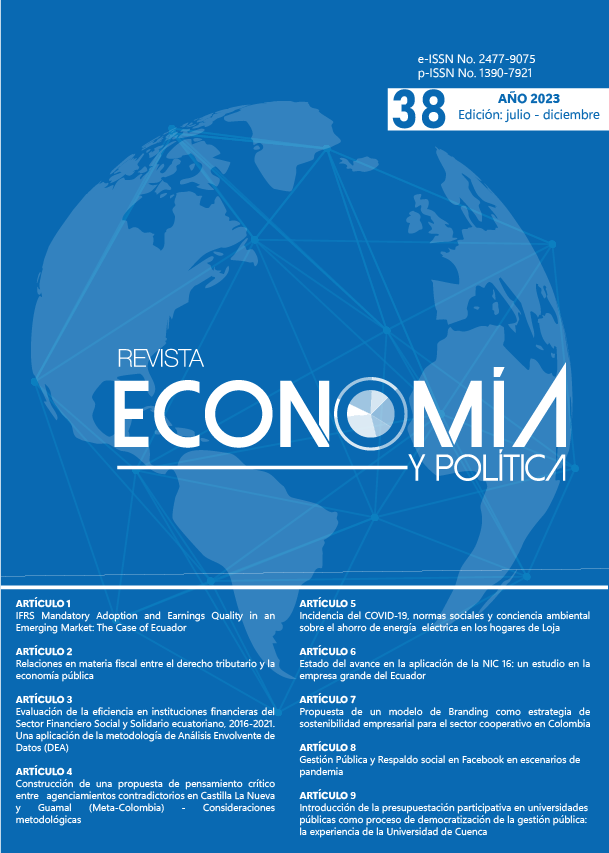IFRS Mandatory Adoption and Earnings Quality in an Emerging Market: The Case of Ecuador
DOI:
https://doi.org/10.25097/rep.n38.2023.01Palabras clave:
NIIF, calidad de utilidades, asimetría en reconocimiento oportuno de pérdidasResumen
Este documento examina los cambios en la calidad de las utilidades, ajustes por devengo, suavización de ganancias y asimetría en reconocimiento oportuno de pérdidas posteriores a la adopción obligatoria de las NIIF en Ecuador. Utilizando 5.436 observaciones anuales de empresas y un enfoque de diferencias-en-diferencias, comparamos el impacto en un grupo inicial de adoptantes (empresas que cotizan en bolsa) con no adoptantes (pequeñas y medianas empresas). Los hallazgos indican disminución en los ajustes por devengo y reconocimiento más oportuno de las pérdidas, sin cambios en la suavización de las ganancias, sugiriendo que las empresas utilizan la mayor flexibilidad de las NIIF para reconocer más oportunamente las pérdidas. La disminución en los ajustes sugiere gestión de ganancias para efectos fiscales. Este estudio contribuye a la literatura sobre las NIIF y la calidad de las ganancias mediante el uso de un diseño de investigación más sólido y proporcionando evidencia sobre las consecuencias de la adopción de las NIIF en un mercado emergente dominado por el capital de deuda y las empresas familiares.
Descargas
Citas
Ahmed, A. S., Neel, M. and Wang, D. (2013). ‘Does Mandatory Adoption of IFRS Improve Accounting Quality? Preliminary Evidence’, Contemporary Accounting Research, Vol. 30, No. 4, 1344-1372.
André, P., Filip, A. and Paugam, L. (2015). “The Effect of Mandatory IFRS Adoption on Conditional Conservatism in Europe.”. Journal of Business Finance and Accounting, Vol. 42, Nos. 3–4, 482–514.
Ball, R., Robin, A. and Shuang Wu, J. (2003). Incentives versus standards: properties of accounting income in four East Asian countries. Journal of Accounting and Economics, 36(1-3, 235-270.
Ball, R. and Shivakumar, L. (2005). “Earnings Quality in UK Private Firms: Comparative Loss Recognition Timeliness”, Journal of Accounting and Economics, Vol. 39, 83-128.
Ball, R. and Shivakumar, L. (2006). The role of accruals in asymmetrically timely gain and loss recognition. Journal of Accounting Research, 44(2), 207-242.
Barth, M., Landsman, W. and Lang, M. (2008). “International Accounting Standards and Accounting Quality”, Journal of Accounting Research, Vol. 46, No. 3, 467-498.
Basu, S. (1997). “The conservatism principle and the asymmetric timeliness of earnings”. Journal of Accounting and Economics, Vol. 24, No. 1, 3-37.
Bolsa de Valores Quito (2010). Informe mensual sobre las negociaciones en la BVQ.
Burgstahler, D., Hail, L. and Leuz, C. (2006). ‘The Importance of Reporting Incentives: Earnings Management in European Private and Public Firms’, The Accounting Review, Vol.81, No.5, 983-1016.
Bushman, R. and Piotroski, J. (2006). ‘Financial Reporting Incentives for Conservative Accounting: The Influence of Legal and Political Institutions’, Journal of Accounting and Economics, Vol.42, Nos.1&2, 107-148.
Camino, M. S. and Bermudez, B. N. (2018). “Las Empresas Familiares en el Ecuador: Definición y aplicación metodológica”. X-Pedientes Económicos, Vol. 2, No. 3, 46–72.
Capkun, V., Collins, D. and Jeanjean, T. (2016). “The effect of IAS/IFRS adoption on earnings management (smoothing): A closer look at competing explanations”. Journal of Accounting and Public Policy, Vol. 35, No. 4, 352–394.
Capkun, V. and Collins, D. W. (2018). “The Effects of IFRS Adoption on Observed Earnings Smoothness Properties: The Confounding Effects of Changes in Timely Gain and Loss Recognition”. European Accounting Review, Vol. 27, No. 5, 797–815.
Cardona Montoya, J. C., Gómez Sánchez, A. F. and Cano Morales, A. M. (2019). “The impact of international financial reporting standards on accounting quality: Evidence from Latin America and the Caribbean”. Contaduria y Administracion, Vol. 64, No. 4, pp.1–34.
Chen, H., Tang, Q., Jiang, Y. and Lin, Z. (2010). “The role of international financial reporting standards in accounting quality: Evidence from the European Union”. Journal of International Financial Management and Accounting, Vol. 21, No.3, 220–278.
Christensen, H., Lee, E. and Walker, M. (2015). ‘Incentives or Standards: What Determines Accounting Quality Changes around IFRS Adoption?’, European Accounting Review, Vol.24, No.1, 31-61.
Chua, Y. L., Cheong, C. S. and Gould, G. (2012). “The impact of mandatory IFRS adoption on accounting quality: Evidence from Australia”. Journal of International Accounting Research, Vol. 11 No. 1, 119–146.
Cussatt, M., Huang, L. & Pollard, T. (2018). Accounting quality under U.S. GAAP versus IFRS: The case of Germany. Journal of International Accounting Research, 17(3), 21-41.
De George, E.T., Ferguson, C. B. and Spear, N. A. (2013). “How much does IFRS Cost? IFRS adoption and audit fees”. The Accounting Review, Vol.88, No. 2, 429-462.
de Moura, A. A. F., Altuwaijri, A. and Gupta, J. (2020). “Did mandatory IFRS adoption affect the cost of capital in Latin American countries?”. Journal of International Accounting, Auditing and Taxation, 38. 100301
Dechow, P. (1994). ‘Accounting Earnings and Cash Flows as Measures of Firm Performance: The Role of Accounting Accruals’, Journal of Accounting and Economics, Vol.18, No.1, 3-42.
Eiler, L.A., Miranda-Lopez, J. and Tama-Sweet, I. (2021). "The impact of IFRS on earnings management: evidence from Mexico", Journal of Accounting in Emerging Economies, Vol. 12 No. 1, 77-96.
Filipin, R., Tixeira, S.A., Bezerra, F.A. and Da Cunha, P. R. (2012). “Análise do nível de conservadorismo condicional das empresas brasileiras listadas na bm&fbovespa após a adoção dos IFRS”. Revista de Contabilidade e Controladoria, Vol 4, No. 2, 24-36.
Fortin, H., Hirata Barros, A.C. and Cutler, K. (2010) Accounting for Growth in Latin America and the Caribbean: Improving Corporate Financial Reporting to Support Regional Economic Development, Washington D.C.: The World Bank
Fox, A., Hannah, G., Helliar, C. and Veneziani, M. (2013). "The costs and benefits of IFRS implementation in the UK and Italy", Journal of Applied Accounting Research, Vol. 14 No. 1, 86-101.
Garcia Lara, J.M., Garcia Osma, B. and Mora A. (2005). ‘The Effect of Earnings Management on the Asymmetric Timeliness of Earnings’, Journal of Business Finance and Accounting, Vol.32, Nos.3&4, 691-726.
Hail, L., Leuz, C. and Wysocki, P. (2010). ‘Global Accounting Convergence and the Potential Adoption of IFRS by the U.S. (Part I): Conceptual Underpinnings and Economic Analysis‘, Accounting Horizons, Vol. 24, No. 3, 355-394.
Hellman, N., Nilsson, H., Tylaite, M. and Vural, D. (2022). “The Impact of an IFRS for SMEs-Based Standard on Financial Reporting Properties and Cost of Debt Financing: Evidence from Swedish Private Firms”. European Accounting Review, Vol. 31, No. 5, 1175–1205.
Higgins, S., Lont, D. and Scott, T. (2106). “Longer term audit costs of IFRS and the differential impact of implied auditor cost structures”. Accounting and Finance, Vol. 56, No. 1, 165-203.
Iatridis, G. (2010). International Financial Reporting Standards and the quality of financial statement information. International Review of Financial Analysis, 19(3), 193-204.
Instituto Nacional de Estadistica y Censos (2012). Clasificación Nacional de Actividades) CIIU 4.0, Accessed on 25 of May 2013, http://www.inec.gob.ec/estadisticas/SIN/metodologias/CIIU%204.0.pdf
Isidro, H. and I. Raonic (2012). ‘Firm Incentives, Institutional Complexity and the Quality of “Harmonized” Accounting Numbers’, The International Journal of Accounting, Vol.47, No.4, 407-436.
Jara Bertin, M. and Arias Moya, J. T. (2013). “The effect of mandatory IFRS adoption on accounting conservatism of reported earnings”. Academia Revista Latinoamericana de Administración, Vol. 26, No. 1, 139–169.
Kaufman, D., Kraay A. and Mastruzzi, M. (2009). ‘Governance Matters VIII: Aggregate and Individual Governance Indicators 1996-2008’, Policy Research Working Paper 4978, World Bank.
KPMG (2009), Normas Internacionales de Informacion Financiera – Principales Aspectos de su Adopción Comparada con las NEC
Lang, M., Smith Raedy, J., and Wilson, W. (2006). ‘Earnings Management and Cross Listing: Are Reconciled Earnings Comparabe to US Earnings?’, Journal of Accounting and Economics, Vol.42, Nos.1&2, 255-283.
Leuz, C., Nanda, D. and Wysocki, P. (2003). ‘Earnings Management and Investor Protection: An International Comparison’, Journal of Financial Economics, Vol.69, No.3, 505-527.
Liu, C., Yao, L. J., Hu, N. and Liu, L. (2011). “The impact of ifrs on accounting quality in a regulated market: An empirical study of China”. Journal of Accounting, Auditing and Finance, Vol. 26, No. 4, 659–676.
Lopez, H., Jara, M. and Cabello, A. (2020). “IFRS adoption and accounting conservatism in Latin America”. Academia Revista Latinoamericana de Administracion, Vol. 33, Nos. 3–4, 301–320.
McNichols, M. (2002). ‘Discussion of ‘The Quality of Accruals and Earnings: The Role of Accrual Estimation Errors’’, The Accounting Review, Vol.77, Supplement, 61-69.
Muñoz, C (2014). ‘Determinants of Ownership Concentration in Ecuador’, Working Paper, ESPAE Graduate School of Management.
Paananen, M. and Lin, H. (2009). “The development of accounting quality of IAS and IFRS over time: The case of Germany”. Journal of International Accounting Research, Vol. 8, No. 1, 31–55.
Palepu, K., Healy, P. and Peek, E. (2010). Business Analysis and Valuation, IFRS Edition, Hampshire, UK: Cengage Learning, 2nd edition
Rodríguez García, M. del P., Cortez Alejandro, K. A., Méndez Sáenz, A. B. and Garza Sánchez, H. H. (2017). “Does an IFRS adoption increase value relevance and earnings timeliness in Latin America?” Emerging Markets Review, Vol.30, 155–168.
Servicio de Rentas Internas (2012). Guía Referencial para la Conciliación entre Formulario 101 (Declaración del Impuesto a la Renta y Presentación de Balances Formulario Único Sociedades y Establecimientos Permanentes) y el Formulario para la Presentación de Estados Financieros bajo NIIF Emitido por la Superintendencia de Compañías
Superintendencia de compañías, valores y seguros (2006). Resolución No.06.Q.ICI.004, Registro Oficial No.348.
Superintendencia de compañías, valores y seguros (2008). Resolución No.08.G.DSC.010, Registro Oficial No.498.
Worldbank (2005). Report on the observance of Standard and Codes (ROSC), Accessed on 26 of March 2010, http://www.worldbank.org/ifa/Ecuador--AAROSCMarch04FINAL.pdf
Zeghal, D., Chtourou, S. M. and Fourati, Y. M. (2012). “The effect of mandatory adoption of IFRS on earnings quality: Evidence from the European union”. Journal of International Accounting Research, Vol. 11, No. 2, 1–25.
Descargas
Publicado
Cómo citar
Número
Sección
Licencia
Derechos de autor 2023 Revista Economía y Política

Esta obra está bajo una licencia internacional Creative Commons Atribución-NoComercial-CompartirIgual 4.0.






